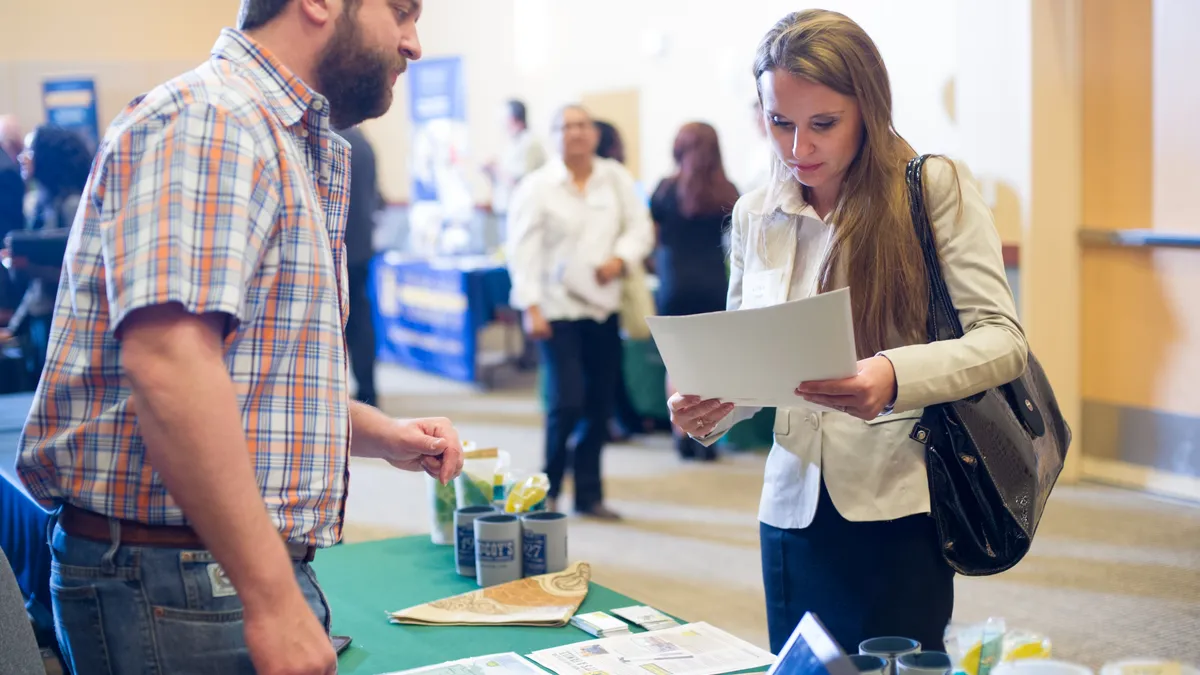Around four in 10 students who enroll in a four-year college don't earn a bachelor's degree from that institution within six years, according to federal data. For community colleges, the outlook is even worse, with their three-year graduation rates hovering under 30%.
It's costly for colleges when students drop out. In the 2010-11 academic year, roughly 1,700 institutions collectively lost out on $16.5 billion of tuition revenue due to students leaving without a credential, according to the Education Policy Institute. Stopped-out students can end up saddled with debt they must pay off without the economic benefit of a degree.
Enter ReUp Education, a company founded in 2015 to help colleges reconnect with this long-overlooked population through a mix of automated messaging and human coaches.
"If you stop out at most universities, that's it," Anne Kubek, the company's chief operating officer, told Education Dive earlier this year. "They don't connect with you. They don't follow up with you. You never hear from them again unless they're looking for monies owed."
The company started its work with three institutions — Bellevue University, Clarion University of Pennsylvania and Western Governors University — and brought back 800 students within a year.
That early success helped it land contracts with an additional three dozen institutions and counting. Much of that ground was gained in the past year.
Some of its most recent clients are massive systems, including Texas A&M and the City University of New York (CUNY), as well as the Pennsylvania State System of Higher Education. With CUNY, ReUp is using a grant from the Bill & Melinda Gates Foundation to hone its methods on some 20,000 students.
"It's meaningful when a coach can say with students, 'Listen, it took me eight years to get my degree. And you know what? It doesn't say that on my diploma.'"

Sarah Horn
CEO, ReUp Education
During the latest summer and fall semesters, the company helped more than 4,000 students reenroll in college and is working with thousands more who are considering returning in the spring. In all, ReUp has brought back more than 10,000 students, bringing in about $35 million in tuition revenue.
Once students reenroll, the company takes a share of their tuition revenue for each semester they're in college. It also provides them with online coaching services designed to help them stay on track through graduation.
Coaches, who are often first-generation or formerly stopped-out students themselves, are picked out carefully.
"It's meaningful when a coach can say with students, 'Listen, it took me eight years to get my degree. And you know what? It doesn't say that on my diploma,'" Sarah Horn, CEO of ReUp, said in an interview with Education Dive. "Those are the kind of anecdotes that can really make a difference in the life of some of these students that have stopped out."
Colleges have spun up their own ways to bring back stopped-out students as well, such as offering them tuition-free classes or forgiving part of their debt upon their return — at times with promising results.
Yet institutions may not have the staffing or technological capabilities to get the same level of response from students as a company solely focused on reenrollment.
For instance, colleges often don't have current contact information for stop-outs.
That was the case for the Texas A&M System, which finalized its contract with ReUp late last year. If officials worked off a list more than three years old, they would "get bounces all over the place," Shonda Gibson, the system's associate vice chancellor for academic affairs, said in an interview with Education Dive.
Outsourcing reenrollment services can be a "win-win" for the institution and the vendor in cases like those, said Iris Palmer, a senior policy advisor at New America.
ReUp isn't the only company helping colleges reenroll students. InsideTrack, which is part of the nonprofit Strada Education Network, offers similar services, though it isn't its sole focus. And the Graduate Network advises stopped-out students and helps communities better support them.
Palmer notes there is significant need for reenrollment support. "The more support and guidance you can give returning students or people who've dropped out of college, the better off we are," she said.
Horn believes ReUp's early momentum will help it stay a leader in the market. "With three to four years under our belt of doing this work and collecting millions of data points," she said, "we've now conditioned ourselves — I'd like to think — as really the expert here."










